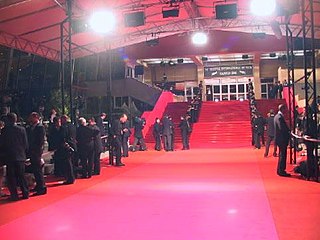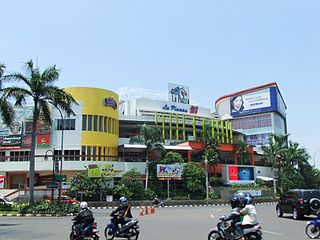
A film festival is an organized, extended presentation of films in one or more cinemas or screening venues, usually in a single city or region. Increasingly, film festivals show some films outdoors. Films may be of recent date and, depending upon the festival's focus, can include international and domestic releases. Some festivals focus on a specific film-maker or genre or subject matter. A number of film festivals specialise in short films of a defined maximum length. Film festivals are typically annual events. Some film historians, including Jerry Beck, do not consider film festivals official releases of film.

70 mm film is a wide high-resolution film gauge for motion picture photography, with negative area nearly 3.5 times larger than the standard 35 mm motion picture film format. As used in cameras, the film is 65 mm (2.6 in) wide. For projection, the original 65 mm film is printed on 70 mm (2.8 in) film. The additional 5 mm are for four magnetic strips holding six tracks of stereophonic sound. Although later 70 mm prints use digital sound encoding, the vast majority of existing and surviving 70 mm prints predate this technology. Each frame is five perforations tall, with an aspect ratio of 2.2:1. With regards to exhibition, 70 mm film was always considered a specialty format reserved for epics and spectacle films shot on 65mm and blockbuster films that were released both in 35 mm and as 70 mm blow-ups. While few venues were equipped to screen this special format, at the height of its popularity most major markets and cities had a theater that could screen it. Some venues continue to screen 70 mm to this day or have even had 70 mm projectors permanently or temporarily installed for more recent 70 mm releases.

This is Cinerama is a 1952 American documentary film directed by Merian C. Cooper and starring Lowell Thomas. It is designed to introduce the widescreen process Cinerama, which broadens the aspect ratio so the viewer's peripheral vision is involved. This is Cinerama premiered on September 30, 1952 at the Broadway Theatre, in New York City.

The National Science and Media Museum, located in Bradford, West Yorkshire, is part of the national Science Museum Group in the UK. The museum has seven floors of galleries with permanent exhibitions focusing on photography, television, animation, videogaming, the Internet and the scientific principles behind light and colour. It also hosts temporary exhibitions and maintains a collection of 3.5 million pieces in its research facility.

Cinerama is a widescreen process that originally projected images simultaneously from three synchronized 35 mm projectors onto a huge, deeply curved screen, subtending 146° of arc. The trademarked process was marketed by the Cinerama corporation. It was the first of a number of novel processes introduced during the 1950s, when the movie industry was reacting to competition from television. Cinerama was presented to the public as a theatrical event, with reserved seating and printed programs, and audience members often dressed in their best attire for the evening.

The International Film Festival Rotterdam (IFFR) is an annual film festival held at the end of January in various locations in Rotterdam, the Netherlands. Since its foundation in 1972, it has maintained a focus on independent and experimental filmmaking by showcasing emerging talents and established auteurs. The festival also places a focus on presenting cutting edge media art and arthouse film, with most of the participants in the short film program identified as artists or experimental filmmakers. IFFR also hosts CineMart and BoostNL, for film producers to seek funding.

The Odeon Leicester Square, currently branded Odeon Luxe Leicester Square, is a prominent cinema building in the West End of London. Built in the Art Deco style and completed in 1937, the building has been continually altered in response to developments in cinema technology, and was the first Dolby Cinema in the United Kingdom. The cinema is often used for film premieres.

Pacific Theatres' Cinerama Dome is a movie theater located at 6360 Sunset Boulevard in Hollywood, California. Designed to present widescreen Cinerama films, it opened November 7, 1963. Today it continues as a leading first-run theater. The original developer was William R. Forman, founder of Pacific Theatres.

Todd-AO is an American post-production company founded in 1953 by Mike Todd and Robert Naify, providing sound-related services to the motion picture and television industries. For more than five decades, it became the worldwide leader in theater sound. The company operates three facilities in the Los Angeles area.

The Prince Edward Theatre is a West End theatre situated on Old Compton Street, just north of Leicester Square, in the City of Westminster, London.
Hany Abu-Assad is a Dutch-Palestinian-Israeli film director. He has received two Academy Award nominations: in 2006 for his film Paradise Now, and again in 2013 for his film Omar.

The Seattle Cinerama Theatre is a landmark movie theater in Seattle, Washington, United States. Located in the city's Belltown neighborhood, it is one of only three movie theaters in the world still capable of showing three-panel Cinerama films.
Kinopanorama is a three-lens, three-film widescreen film format. Although Kinopanorama was initially known as Panorama in the Soviet Union the name was later revised to include its current name prior to the premier screenings in Moscow in 1958. In some countries, including Cuba, Greece, Norway and Sweden, it was usually marketed as Soviet Cinerama. In 1958, during which time Great Is My Country and The Enchanted Mirror, were exhibited at the Mayfair Theatre in New York City, it was briefly advertised as Cinepanorama. Kinopanorama is for the most part identical in operation to that of Fred Waller's American-designed Cinerama format.
Middle Eastern Cinema collectively refers to the film industries of the Middle East. By definition, it encompasses the film industries of Bahrain, Cyprus, Egypt, Iraq, Israel, Jordan, Kuwait, Lebanon, Palestine, Oman, Qatar, Saudi Arabia, Syria, United Arab Emirates, and Yemen.

Cinema of Indonesia has a long history dated back to 1900. Until the 1920s, cinema in Indonesia belonged only to the Europeans, with silent documentaries and feature films imported from France and the United States. Documentaries about the nature and life of Indonesia, sponsored by the Dutch East Indies government were made by the Dutch people or Europeans. Domestic production of documentaries had begun in 1911. During that time, there was a film called Onze Oost or Timur Milik Kita (1919). However, the first domestically produced film in the Dutch East Indies was in 1926: Loetoeng Kasaroeng, a silent film, which was an adaptation of the Sundanese legend of the same name. During 1926, there were movie theatres named as Oriental and Elita in Bandung. The first movie theatre in Jakarta was Alhamra, which was opened in 1931.

Arab cinema or Arabic cinema refers to the cinema of the Arab world.
The cinema of Lebanon, according to film critic and historian Roy Armes, is the only other cinema in the Arabic-speaking region, beside Egypt's, that could amount to a national cinema. Cinema in Lebanon has been in existence since the 1920s, and the country has produced more than 500 films.

Hollywood Pacific Theatre is a movie theater located at 6433 Hollywood Boulevard in Hollywood, Los Angeles, California, along the famous Hollywood Walk of Fame.
Sanjeewa Pushpakumara born on 5 May 1977 in the Eastern Province of Sri Lanka, completed his Bachelor of Arts degree at the University of Sri Jayewardenepura in 2005. In 2008, he obtained his master's degree in Mass Communications from the University of Kelaniya. Sanjeewa, pursued a diploma in film making at the Sri Lanka National Film Corporation in 2006. In 2007, Pushpakumara received a scholarship from the Korean Culture and Tourism Ministry under its Cultural Partnership Initiative (CPI), to study film-making in the Asian Young Film Forum and also to learn Korean language at Chonbuk National University (Korea).In 2014 he obtained his advanced degree in film-making from the Chung-Ang University in South Korea as a Korean Government Scholarship Holder (KGSP). In 2009, Sanjeewa was selected to the Asian Film Academy of Busan International Film Festival.He participated in Berlin Talent Campus in 2012.

Amal Ramsis is an Egyptian filmmaker. She studied directing at the International Film and Television School in Madrid.


















